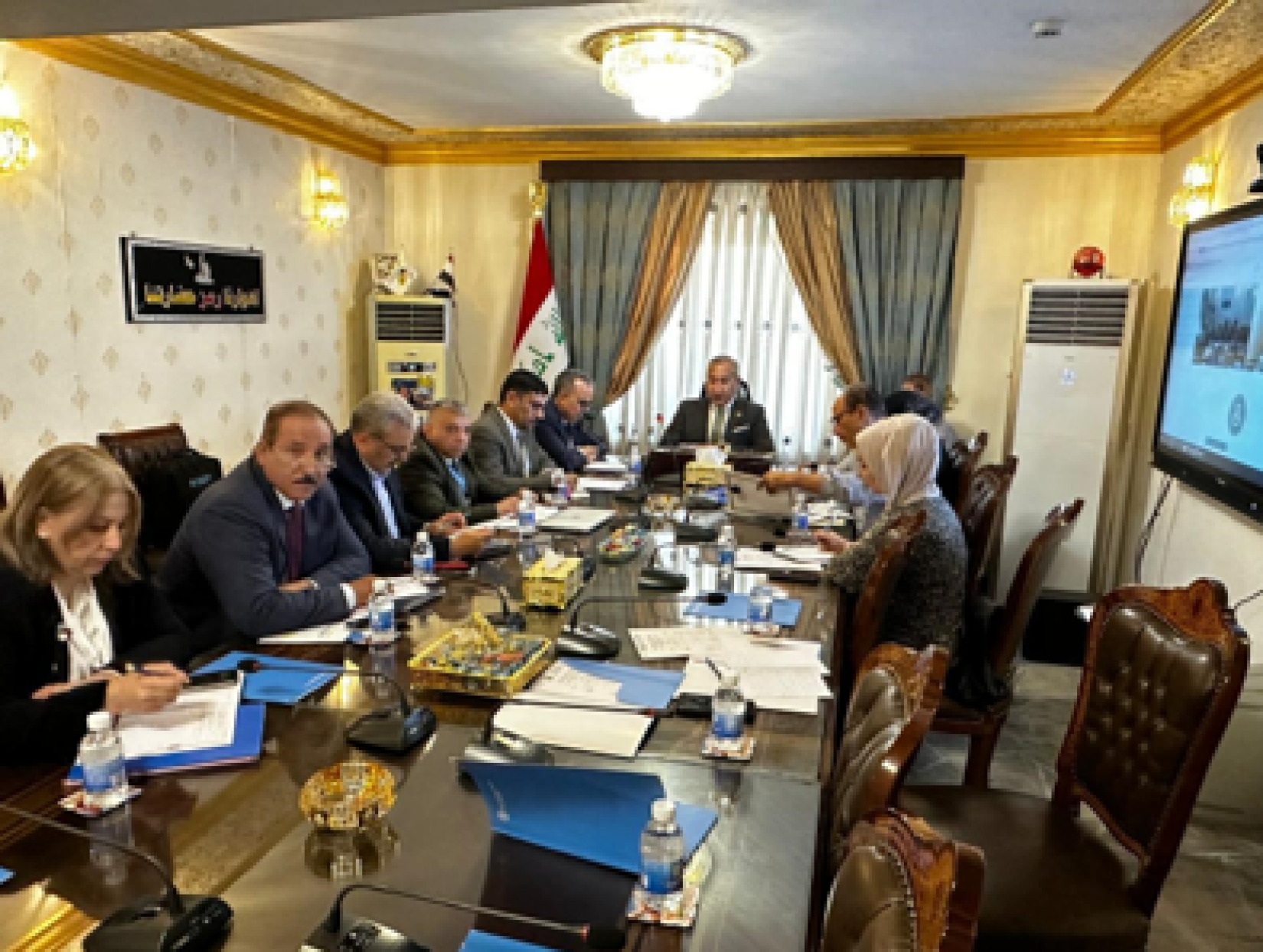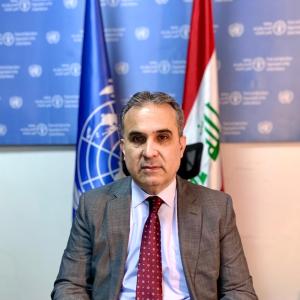FAO and MOE are developing the National Strategy for Sustainable Land Management in Iraq
03 September 2024

Baghdad, September 2nd, 2024 - The Food and Agriculture Organization of the United Nations (FAO) in Iraq, conducted the annual National Project Steering Committee under the project "Sustainable Land Management (SLM) for Improved Livelihoods in Degraded Areas of Iraq," funded by the Global Environment Facility (GEF) and implemented in partnership with the Iraqi Ministries of Environment (MoE), Agriculture (MoA), Water Resources (MoWR) as well as local governments in Thi Qar and Muthana.
The meeting, chaired by Dr Jassim Al-Falahi, Technical Deputy of the MoE and Dr. Salah ElHajj Hassan, FAO Country Representative in Iraq, focused on the project implementation progress, challenges and suggested solutions to strengthen collaboration on promoting conservation agriculture and agroecological practices in ThiQar and Al Muthanna governorates.
The project outcomes yet included drafting the national SLM strategy, inclusive of a Marshland Conservation Action Plan, and finalizing the natural resources Knowledge Management Platform for Iraq, in addition to train 121 officials (31% females) from MoA, MoE and MoW on SLM policy making and 1500 farmers (21 % women) on Conservation Agriculture.
Presented results showed an increase of 20-25% in crop yield of wheat and barley productivity as a result of adopting of conservation agriculture practices, demonstrating the significant benefits of conservation agriculture in sustainable land management.
Next steps include finalizing the national SLM and marshland conservation Strategy for Iraq in cooperation with MoE, train 40 MoA Extension Officers in Agroecology and Marshland Conservation, and establish Farmer Field School Demonstration plots under Agroecology practice across Thi Qar and Al-Muthanna governorates, in addition to training 1000 farmers on promoting Agroecology practices of SLM.
Dr. Jassim Al-Falahi, the Technical Deputy Minister of Environment, emphasized the importance of the partnership with FAO Iraq, stating that, "The environmental challenges facing Iraq due to climate change induced water scarcity, drought, desertification and land degradation. The Technical Department at the MoE is partnering with international organizations like FAO, to improve land management and insure sustainability. We value the collaboration with FAO Iraq, and the project's role in enhancing our efforts."
"The successful outcome of the recent harvest from Farmer Field School Demonstration plots underscores the effectiveness of Conservation Agriculture practices in enhancing agricultural productivity and promoting sustainable land management," said Dr. Salah El Hajj Hassa, FAO Iraq Representative. "We are committed to continuing our collaboration with the Iraqi Ministries of Environment, Agriculture, Water Resources, local governments in Thi Qar and Muthana and other partners to further promote sustainable agriculture practices and improve livelihoods."
This project aligns with several Sustainable Development Goals (SDGs), including SDG 2 (Zero Hunger), SDG 13 (Climate Action), and SDG 15 (Life on Land). By promoting sustainable land management practices, that will be enhancing local communities resilience and contributing to global environmental benefits.

He started his career in 1984, as Senior Research Assistant in the Agricultural Research and Education Centre (AREC), American University of Beirut. From 1987 to 1991, he was Coordinator of the Student Training Programme, and also Agriculture and Horticultural Teacher for the Faculty of Agriculture, at the Lebanese University.
From 1991 to 1995, he worked as Agricultural Engineer at the Ministry of Agriculture, Bekaa Regional Office, Zahlah and was then assigned to the Agricultural Research Institute in the Tal Amara station, first as Head of the Crop Production Department and subsequently in charge of the Plant Protection Laboratory. From 2002 to 2006, he was Director of the Kfardane Research Station (Agricultural Research Institute). In 2008, he became Visiting Scientist at the International Maize and Wheat Improvement Centre (CIMMYT) and Coordinator of a project with the International Centre for Atomic Energy Agency, Vienna.
In 2010, he served as Advisor to the Minister for Agriculture of Lebanon. In 2011, he became President of the Pesticide Scientific Committee, Head of the Phytoplasma Committee and Director of the Agriculture and Rural Development Programme (ARDP) (EU-funded project). From 2010 to 2013, he represented Lebanon in negotiations with EU, Egypt, Jordan and Iraq. During his career, Mr Hajj Hassan also carried out a number of other functions. He represented the Lebanese Agricultural Research Institute (LARI) in several research programmes with the International Centre for Agricultural Research in the Dry Areas (ICARDA) and the American University of Beirut. He was Coordinator of the Mashreq/Maghreb project with ICARDA, representing Lebanon in the Steering Committee, as well as being the Head of the Sugar-beet Delivery and of the Wheat Delivery Committees. For a number of years, Mr Hajj Hassan worked for the preparation of FAO TCP projects and served as the National Director of a TCP project. He joined FAO in January 2014 as FAO Representative in Yemen. Mr Hajj Hassan succeeds Mr El Zubi as FAO Representative in Iraq.



